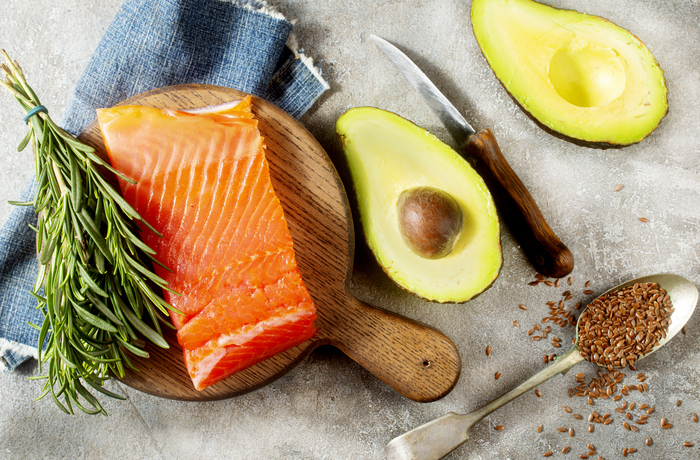
The FDA-approved weight loss pill is here
No injections. Just once-daily Wegovy® with proven results—up to 17% average weight loss in trials.

Recently there has been a lot of interest in glucagon-like peptide 1 (GLP-1) medications. Especially because of their impact on managing weight and overall metabolic well-being. GLP-1 is a hormone that is naturally secreted by the intestines and plays a role in controlling hunger levels, blood sugar regulation, and the digestive process. While many are turning to medications that target GLP-1 for weight loss purposes (like semaglutide medications, often used for diabetes and obesity). There is now a growing curiosity about how to encourage the body's natural production of this hormone. Read on to discover some natural ways you can increase your GLP-1 levels.
First, it’s important to understand how adequate GLP-1 secretion plays a role, in weight reduction — according to BioMed Central, it delays the process of stomach emptying to make you feel full for periods after meals. It also sends signals to the brain to decrease hunger and food consumption making it easier to cut down on calorie intake — similar to an appetite suppressant. This hormone is also responsible for enhancing insulin sensitivity and regulating blood sugar levels — ultimately leading to improved metabolic health and weight control. Knowing this, it is easy to understand why people who are diagnosed with obesity can benefit from GLP-1 medications.
While medications are appropriate for many individuals, some individuals can benefit from exploring natural approaches to boost GLP-1 levels instead of relying on medication to supplement a good diet. Some researchers believe that certain food choices can stimulate the body's production and release of GLP-1 secretion in the intestines. These researchers, as discussed in various NIH research publications, propose that incorporating these foods into your meals or snacks could naturally increase your natural GLP-1 levels. Potentially assisting you in reaching your weight goals and improving insulin sensitivity and blood sugar levels without the use of GLP-1 medications. Below are some food options that might help you enhance your GLP-1 levels naturally:
Healthy fats, such as salmon, mackerel, sardines, avocado, olives and olive oil, and flaxseeds
Lean proteins, such as fish, chicken, turkey, eggs, lean beef, low-fat dairy, tofu, and soybeans
Foods rich in soluble fiber, such as fruits, vegetables, whole grains, legumes, flaxseeds, and chia seeds
Additionally, fermented foods, nuts and seeds, green tea, and spices like cinnamon and turmeric are also thought to be beneficial in raising GPL-1 levels naturally and improving overall gut health.
Although dietary changes are likely to have the greatest effect, increasing GLP-1 levels through supplementation might offer another avenue for adding to your body’s own natural GLP-1 production. As with all supplements, these are offered for your information. Please check with your doctor before adding any new supplements to your routine. Here is a list of supplements that researchers from various NIH resources note you should consider:
The water-soluble fiber psyllium comes from the husks of Plantago ovata seeds, commonly used to promote digestive health and regularity. It increases GLP-1 levels, probably due to fermentation in the gut, which also leads to GLP-1 secretion.
Berberine is a compound in many plants that has been used in traditional Chinese medicine for centuries. Clinical trials show that berberine can increase GLP-1 levels and improve insulin sensitivity, both of which might support weight management and metabolic health.
Yerba mate is a traditional South American herbal tea. It is a stimulant like tea, coffee or cocoa. When consumed rhythmically, yerba mate reportedly reduces feelings of hunger. Yerba mate has been shown to stimulate GLP-1 secretion in some studies, lending support to the drink’s credited ability to promote weight loss.
Curcumin, the active component in turmeric, has potent anti-inflammatory and antioxidant properties. Studies have shown that curcumin can boost GLP-1 levels that can aid your management of glucose and weight.
Korean red ginseng also upregulates GLP-1 secretion, and may also help by reducing your cortisol levels and your blood sugar levels. So, ginseng might also be useful if you’re trying to raise your GPL-1 naturally — in fact, ginseng tea actually has many health benefits!
Also known as bitter melon, the wild bitter gourd plant is related to cucumbers and melons and has long been used in traditional medicine to treat diabetes. Some researchers believe it could also help regulate the secretion of the body’s own glucose and GLP-1 hormone.
Solv can connect you with a licensed weight loss professional who can help you with your weight loss journey. If you’re interested in the latest in GLP-1 treatments to manage your weight or consulting with a nearby weight loss provider, Solv can help you find qualified specialists in your area — visit Solv to find weight loss help near you.
GLP-1, or Glucagon-like peptide, is a hormone naturally secreted by the intestines. It plays a crucial role in managing weight and overall metabolic health by controlling hunger levels, regulating blood sugar, and aiding the digestive process. It delays stomach emptying, making you feel full for longer periods after meals, and sends signals to the brain to decrease hunger and food consumption. It also enhances insulin sensitivity and regulates blood sugar levels, leading to improved metabolic health and weight control.
Certain food choices and supplements can stimulate the body's natural production and release of GLP-1. Foods that can potentially boost GLP-1 levels include healthy fats (like salmon, mackerel, avocado, olives, and flaxseeds), lean proteins (like fish, chicken, turkey, and eggs), and foods rich in soluble fiber (like fruits, vegetables, whole grains, and legumes). Supplements that can increase GLP-1 levels include psyllium, berberine, yerba mate, curcumin, ginseng, and wild bitter gourd.
Yes, dietary changes are likely to have the greatest effect on increasing GLP-1 levels. Incorporating foods that stimulate the body's production and release of GLP-1 into your meals or snacks could naturally increase your GLP-1 levels, assisting in reaching weight goals and improving insulin sensitivity and blood sugar levels.
The article does not mention any specific side effects of increasing GLP-1 levels. However, as with any changes to diet or supplement routine, it is always recommended to consult with a healthcare professional before making any significant changes.
Yes, certain supplements can potentially increase your body’s natural GLP-1 production. These include psyllium, berberine, yerba mate, curcumin, ginseng, and wild bitter gourd. However, it is important to consult with your doctor before adding any new supplements to your routine.

No injections. Just once-daily Wegovy® with proven results—up to 17% average weight loss in trials.